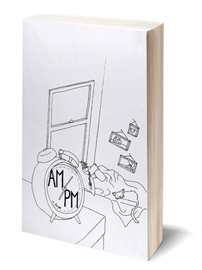Deus ex McFlurry: An Interview with Amelia Gray

This year saw the release of Amelia Gray’s second book, a collection of texts from FC2 called Museum of the Weird. More than a simple consolidation of stories into a single body, or even a creation of texts within the confines of one body and a strong mind, Museum of the Weird seems an object bent out of the mysterious and new, taking foreign objects, mysterious relations, freak peoples, and bringing them together in a wilding chorus of the strange and, holy shit, the entertaining, addictive. Last month I traded a bunch of emails with Amelia re: the new book, how she works, the function of belief, fate, trying, and just what the hell is with all the eating of the hair that shows up all throughout her writing.
* * *
B: Amelia, your prose has an interesting quality of being at once familiar and intuitive, while also at a seeming kind of remove: beyond just using objects and animals as active elements, there is at all times a feeling that you are way back in there somewhere, narrating your way your way rationally out of these intensely messed up, or as you say “weird,” prompts. Do you think your writing is a kind of emotional propaganda? Is all writing emotional propaganda?
A: The phrase “emotional propaganda” strikes me as redundant because any effective piece of rhetoric contains some emotional element. In propaganda and in writing there is an actor with an intent and an audience, a communicating element and a receiving element. Effective propaganda sets up a world in which only one outcome is possible in the same way that a great tragic story drives its characters towards an inescapable fate. So sure, in the way each genre stands as a completed product, writing is a kind of message propaganda that ultimately stands to aid or question a cause/idea/person. Fiction tends to attack or support ideas like love or trust or babies via scenes and characters, while war propaganda, for example–thinking of WWII posters here–attacks or supports a country or cause using ideas like love or trust or babies. There’s an emotional appeal in each, driven towards a point or points.
The biggest difference is that war propaganda or motivational speeches tend to get created with a message in mind beforehand, while fiction doesn’t have to be created in the same way (though it can be). When I write, I tend to start with a very basic idea or image (all these could be described as prompts, sure) and write my way out of it. Someone creating a political image might do the opposite–begin with a larger point and work to seek out its supporting evidence–but we end up in roughly the same place.
“Propaganda” doesn’t insinuate emptiness, nor does it have to suggest a singular message, nor does it have to be negative, but it does suggest that there’s ultimately a point to every message. Same with fiction or poetry or advertising or journalism: if a string of letters doesn’t make any words, the point might be that there’s no point, or there might be a different point, point is there’s a point.
B: Once you have your idea, say, babies, how do you go about “writing your way out of it”? How do you know when you are “out”?
A: In the story I wrote about babies called “Babies,” I started with an ordinary fear of accidental pregnancy and unwilling parents and put it into the context of an irrational fear, where the baby is immediately there and there’s no time to have serious conversations or hold a baby shower or make a doctor’s appointment. The ordinary fear combines with the irrational fear and sets off a rational string of events. Obviously the woman is going to want to clean everything up. The baby is hungry, there’s no food in the house. That’s a more comic story, things are lightly touched. I could have made it more about umbilical cord infections or traumatic blood loss or flesh ripping or whatever, but I wanted to keep the real bumping up against the unreal, babies floating inside balloons. At the end I felt the impulse to make it a happy story, where the relationship is saved and the individuals are improved, and then I felt the impulse to crush that impulse in as few words as possible, and then I felt I was out. I had the plot of that story down fast, so I remember the impulses shifting. That’s not how it always goes but it’s how it went then.
November 29th, 2010 / 1:22 pm
Word Spaces (12): Amelia Gray
Amelia Gray is the author of AM/PM (featherproof) and Museum of the Weird (forthcoming from FC2). She recently won the FC2 Fiction Prize. I’ve linked to a page on her website that lists many publications online that you may read over. Also, here’s an audio recording of Amelia’s reading from AM/PM in Tucson for a reading thing at Congress, I think.
Various information about her and her work can be read here:
AM/PM reviewed at Literary License
Amelia Gray’s favorite novellas
Below is her word space. Enjoy.
Amelia Gray’s AM/PM
 Out this month from Featherproof, as a kickoff to their brand new and already brain-changing Paper Egg Books: Amelia Gray’s fabulous AM/PM, a short novel that follows “23 characters across 120 stories full of lizard tails, Schrödinger boxes and volcano love.”
Out this month from Featherproof, as a kickoff to their brand new and already brain-changing Paper Egg Books: Amelia Gray’s fabulous AM/PM, a short novel that follows “23 characters across 120 stories full of lizard tails, Schrödinger boxes and volcano love.”
I was already really excited about this before I saw how beautiful the book is (as is to be expected in the nimble hands of designer Zach Dodson), having continually been wowed and had my skirt blown up by Amelia’s work in the past, such as this amazing story in the Diagram Innovative Fiction finalists, and Caketrain, American Short Fiction, etc.
Last night, though, reading AM/PM from cover to cover before bed, I could not stop rotating between the sharp, quick gut giggles that Amelia’s layered one liners continually deliver, and awe at her unmatched ability to meld the everyday minutiae of houses and people-talk with moments of pure existential terror and sublime gloaming.
